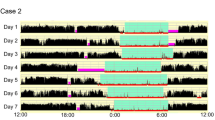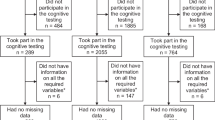Abstract
Disruption of the circadian rhythm and sleep–wake cycles is a consequence of aging and is associated with the cognitive decline and many neurodegenerative conditions. We investigated the bedtime, wake-up time, sleep timing (midpoint between bedtime and wake-up time), and sleep timing standard deviation (SD) using the actigraphy among 80 consecutive volunteers aged ≥ 60 years. Global cognitive function and executive function of detailed cognitive domains were evaluated using the mini-mental state examination (MMSE) and Wisconsin card sorting test (WCST) and subjective daytime sleepiness was assessed using the Epworth Sleepiness Scale (ESS). The category achievement (CA), total errors (TE), perseverative errors of Nelson (PEN), non-perseverative errors (NPE), and difficulties in maintaining set (DMS) on the WCST were significantly correlated with sleep timing SD (CA: r = − 0.276, p = 0.013, TE: r = 0.311, p = 0.005, PEN: r = 0.241, p = 0.032, NPE: r = 0.250, p = 0.025, DMS: r = 0.235, p = 0.036), but not with the MMSE score. Multiple regression analyses with the stepwise forward selection method including age, ESS score, bedtime, sleep timing, and sleep timing SD, revealed that the ESS score, and sleep timing SD were significant factors related to CA on the WCST (ESS score: β = − 0.322, p = 0.004; sleep timing SD: β = − 0.250, p = 0.022). Assessment of sleep–wake rhythms, daytime sleepiness, and cognitive function using the MMSE and WCST is valuable for the prediction of cognitive decline in the geriatric population.
Similar content being viewed by others
References
Yaffe K, Falvey CM, Hoang T. Connections between sleep and cognition in older adults. Lancet Neurol. 2014;13(10):1017–28.
Hofman MA, Swaab DF. Living by the clock: the circadian pacemaker in older people. Ageing Res Rev. 2006;5(1):33–51.
Musiek ES, Holtzman DM. Mechanisms linking circadian clocks, sleep, and neurodegeneration. Science. 2016;354(6315):1004–8.
Schmidt C, Peigneux P, Cajochen C. Age-related changes in sleep and circadian rhythms: impact on cognitive performance and underlying neuroanatomical networks. Front Neurol. 2012;3:118.
Keihani A, Mayeli A, Ferrarelli F. Circadian rhythm changes in healthy aging and mild cognitive impairment. Adv Biol (Weinh). 2022. https://doi.org/10.1002/adbi.202200237.
Xiao Q, Shadyab AH, Rapp SR, et al. Rest-activity rhythms and cognitive impairment and dementia in older women: results from the Women’s Health Initiative. J Am Geriatr Soc. 2022;70(10):2925–37.
Folstein MF, Folstein SE, McHugh PR. “Mini-mental state”. A practical method for grading the cognitive state of patients for the clinician. J Psychiatr Res. 1975;12(3):189–98.
Alvarez JA, Emory E. Executive function and the frontal lobes: a meta-analytic review. Neuropsychol Rev. 2006;16(1):17–42.
Gilbert SJ, Burgess PW. Executive function. Curr Biol. 2008;18(3):R110–4.
Binetti G, Magni E, Padovani A, et al. Executive dysfunction in early Alzheimer’s disease. J Neurol Neurosurg Psychiatry. 1996;60(1):91–3.
Kondo T, Osugi S, Shimokata K, et al. Smoking and smoking cessation in relation to all-cause mortality and cardiovascular events in 25,464 healthy male Japanese workers. Circ J. 2011;75(12):2885–92.
Cho Y, Shin SY, Won S, et al. Alcohol intake and cardiovascular risk factors: a Mendelian randomisation study. Sci Rep. 2015;5:18422.
Umemura S, Arima H, Arima S, et al. The Japanese Society of Hypertension Guidelines for the Management of Hypertension (JSH 2019). Hypertens Res. 2019;42(9):1235–481.
Takegami M, Suzukamo Y, Wakita T, et al. Development of a Japanese version of the Epworth Sleepiness Scale (JESS) based on item response theory. Sleep Med. 2009;10(5):556–65.
Doi Y, Minowa M, Uchiyama M, et al. Psychometric assessment of subjective sleep quality using the Japanese version of the Pittsburgh Sleep Quality Index (PSQI-J) in psychiatric disordered and control subjects. Psychiatry Res. 2000;97(2–3):165–72.
Cole RJ, Kripke DF, Gruen W, et al. Automatic sleep/wake identification from wrist activity. Sleep. 1992;15(5):461–9.
Youngstedt SD, Kripke DF, Elliott JA, Klauber MR. Circadian abnormalities in older adults. J Pineal Res. 2001;31(3):264–72.
O’Bryant SE, Humphreys JD, Smith GE, et al. Detecting dementia with the mini-mental state examination in highly educated individuals. Arch Neurol. 2008;65(7):963–7.
Banno M, Koide T, Aleksic B, et al. Wisconsin card sorting test scores and clinical and sociodemographic correlates in Schizophrenia: multiple logistic regression analysis. BMJ Open. 2012;2(6): e001340.
Walsh CM, Blackwell T, Tranah GJ, et al. Weaker circadian activity rhythms are associated with poorer executive function in older women. Sleep. 2014;37(12):2009–16.
Tranah GJ, Blackwell T, Stone KL, et al. Circadian activity rhythms and risk of incident dementia and mild cognitive impairment in older women. Ann Neurol. 2011;70(5):722–32.
Goshiki T, Miyahara M. Effects of individual differences and irrelevant speech on WCST and STROOP test. Psychologia. 2008;51:28–45.
Kokudai Y, Honma M, Masaoka Y, et al. Cascade process mediated by left hippocampus and left superior frontal gyrus affects relationship between aging and cognitive dysfunction. BMC Neurosci. 2021;22(1):75.
Okazaki T, Saeki S, Hachisuka K. Adolescent normative data on simple neuropsychological tests for cognitive behavioral disorders: mini-mental state examination, trail making test, Wisconsin card sorting test-KFS version and Miyake’s verbal paired-associate learning test. Jpn J Rehabil Med. 2013;50(12):962–70 (In Japanese).
Gabelle A, Gutierrez LA, Jaussent I, et al. Excessive sleepiness and longer nighttime in bed increase the risk of cognitive decline in frail elderly subjects: the MAPT-sleep study. Front Aging Neurosci. 2017;9:312.
Carvalho DZ, St Louis EK, Boeve BF, et al. Excessive daytime sleepiness and fatigue may indicate accelerated brain aging in cognitively normal late middle-aged and older adults. Sleep Med. 2017;32:236–43.
Carvalho DZ, St Louis EK, Knopman DS, et al. Association of excessive daytime sleepiness with longitudinal β-amyloid accumulation in elderly persons without dementia. JAMA Neurol. 2018;75(6):672–80.
Blackwell T, Yaffe K, Ancoli-Israel S, et al. Poor sleep is associated with impaired cognitive function in older women: the study of osteoporotic fractures. J Gerontol A Biol Sci Med Sci. 2006;61(4):405–10.
Ma Y, Liang L, Zheng F, et al. Association between sleep duration and cognitive decline. JAMA Netw Open. 2020;3(9): e2013573.
Okuda M, Noda A, Iwamoto K, et al. Effects of long sleep time and irregular sleep-wake rhythm on cognitive function in older people. Sci Rep. 2021;11(1):7039.
Blackwell T, Yaffe K, Ancoli-Israel S, et al. Associations between sleep architecture and sleep-disordered breathing and cognition in older community-dwelling men: the osteoporotic fractures in men sleep study. J Am Geriatr Soc. 2011;59(12):2217–25.
Kato K, Noda A, Yasuma F, et al. Effects of sleep-disordered breathing and hypertension on cognitive function in elderly adults. Clin Exp Hypertens. 2020;42(3):250–6.
Funding
The study was supported by the Japan Society for the Promotion of Science (KAKENHI Grant number 25282210, 21K07563) and Chubu University research Grant (number 19M27A1, 20M25A1).
Author information
Authors and Affiliations
Contributions
Conception or design; AN. Acquisition; AN, MO. Analysis; MO, AN. Interpretation of data; AN, MO, KI, NH, SM. Drafting the work; MO, AN. Revising it critically for important intellectual content; FY, TT, NO, JAS, SM.
Corresponding author
Ethics declarations
Conflict of interest
The authors declare that they have no conflicts of interest.
Ethical approval
All procedures performed were in accordance with the Declaration of Helsinki and Japan's Ethical Guidelines for Medical and Health Research Involving Human Subjects. This study was approved by the Ethics Committee of Chubu University (Approval number: 270098).
Informed consent
Written informed consent was obtained from all participants included in the study.
Additional information
Publisher's Note
Springer Nature remains neutral with regard to jurisdictional claims in published maps and institutional affiliations.
Rights and permissions
Springer Nature or its licensor (e.g. a society or other partner) holds exclusive rights to this article under a publishing agreement with the author(s) or other rightsholder(s); author self-archiving of the accepted manuscript version of this article is solely governed by the terms of such publishing agreement and applicable law.
About this article
Cite this article
Okuda, M., Noda, A., Iwamoto, K. et al. Assessment of cognitive function and sleep–wake rhythms in community-dwelling older adults. Sleep Biol. Rhythms 22, 137–145 (2024). https://doi.org/10.1007/s41105-023-00491-z
Received:
Accepted:
Published:
Issue Date:
DOI: https://doi.org/10.1007/s41105-023-00491-z




